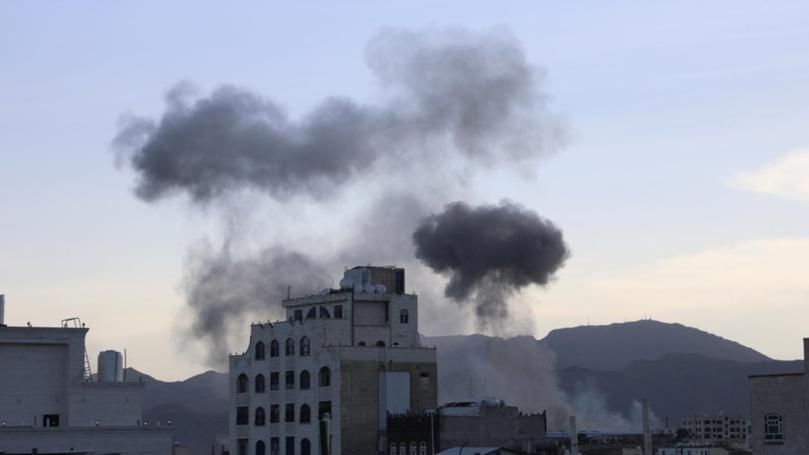US military carries out multiple strikes against Houthis in Yemen, official says, as Israel hits Beirut
The US military struck a number of cities in Yemen controlled by the Iran-linked Houthi movement days after the group threatened ‘escalating military operations’ in Israel.

Air strikes have been launched at several parts of Yemen including its capital Sanaa and Hodeidah airport, al-Masirah TV, the main television news outlet run by the Houthi movement controlling much of Yemen, and residents say.
Strikes also targeted the south of Dhamar city and the southeast of al-Bayda province, the channel added.
Residents said that the attack on al-Bayda province targeted several Houthi military outposts.
Sign up to The Nightly's newsletters.
Get the first look at the digital newspaper, curated daily stories and breaking headlines delivered to your inbox.
By continuing you agree to our Terms and Privacy Policy.Al-Masirah TV reported that the strikes had been carried out by the United States and United Kingdom but a UK government source said UK forces were not involved.
The US military carried out multiple strikes against targets linked to Houthi fighters, a US official speaking on condition of anonymity told Reuters.
The strikes come just days after the Houthis threatened “escalating military operations” targeting Israel after they apparently shot down a US military drone flying over Yemen.
Iran-aligned Houthi militants have launched attacks on international shipping near Yemen since last November in solidarity with Palestinians in Israel’s war with Hamas.
The Houthi attacks have drawn US and UK retaliatory strikes and disrupted global trade as ship owners reroute vessels away from the Red Sea and Suez Canal to sail the longer route around the southern tip of Africa.
Following the air strikes, a Houthi spokesman called the attack “a desperate attempt,” adding that “Yemen will not be deterred by these attacks and will continue its steadfastness in confronting the enemies”.
Israel said it had targeted the intelligence headquarters of Hezbollah in Lebanon and was assessing the damage on Friday after a series of strikes on senior figures in the group that Iran’s Supreme Leader dismissed as counterproductive.
The air attack on Beirut, part of a wide assault that has driven more than 1.2 million Lebanese from their homes, was reported to have targeted the potential successor to the leader of Hezbollah assassinated by Israel a week ago.
Hashem Safieddine’s fate was unclear and neither Israel nor Hezbollah have offered any comment.
The Israeli military said on Friday about 180 shells were fired into Israel from Lebanon.
In the past few days, the army had counted even more shells.
Hezbollah claimed responsibility for several attacks on positions in Israel.
In northern Israel, sirens sounded again several times on Friday but there were no initial reports of victims or damage.
Iranian leader Ayatollah Ali Khamenei told a huge crowd in Tehran that Iran and its regional allies would not back down, two days after Iran raised the stakes when it fired missiles at Israel, which sent ground forces into Lebanon this week.
The Israeli military has said its ground operations are “localised” in villages near the border but it has not specified how far into Lebanon its ground forces would advance or how long the operation is expected to last.
Iran’s missile salvo was partly in retaliation for Israel’s killing of Hezbollah secretary-general Sayyed Hassan Nasrallah, a dominant figure who had turned the group into a powerful armed and political force with reach across the Middle East.
Israel has vowed to respond and oil prices have risen on the possibility of an attack on Iran’s oil facilities as Israel pursues its goals of pushing back Hezbollah militants in Lebanon and eliminating their Hamas allies in Gaza.
“The resistance in the region will not back down even with the killing of its leaders,” Khamenei said in a rare appearance leading Friday prayers in Tehran, mentioning Nasrallah in his speech and calling Iran’s attack on Israel legal and legitimate.
Iran will not “procrastinate nor act hastily to carry out its duty” in confronting Israel, he said, without issuing a direct new threat to Israel or the US but grasping the barrel of a rifle that stood to his left.
Iranian news agency SNN quoted Revolutionary Guards deputy commander Ali Fadavi as saying on Friday that if Israel attacks, Iran would in turn target Israeli energy and gas installations.
Israeli Lieutenant Colonel Nadav Shoshani said on Friday afternoon the military was still assessing the damage caused by airstrikes in southern Beirut on Thursday night, which he said targeted Hezbollah’s intelligence headquarters.
with AP and DPA
